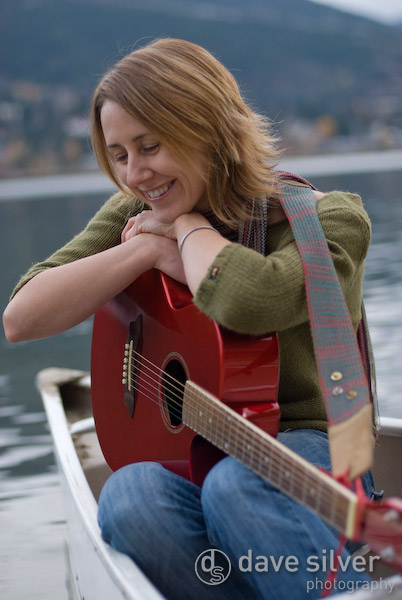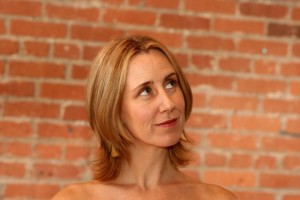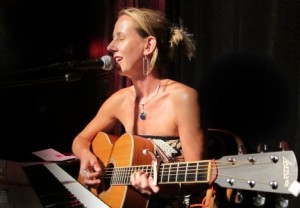 SARAH CALVERT is a modern-day Renaissance woman. She’s an award-winning singer-songwriter and producer who plays guitar, piano and harmonica, and she was assistant musical theatre director for the Mirvish smash My Mother’s Lesbian Jewish Wiccan Wedding. A former high-school English teacher, Sarah is now also a freelance writer, Extreme Freestyle Skiing competitor, sailor, Kundalini yoga instructor … and all around swell gal.
SARAH CALVERT is a modern-day Renaissance woman. She’s an award-winning singer-songwriter and producer who plays guitar, piano and harmonica, and she was assistant musical theatre director for the Mirvish smash My Mother’s Lesbian Jewish Wiccan Wedding. A former high-school English teacher, Sarah is now also a freelance writer, Extreme Freestyle Skiing competitor, sailor, Kundalini yoga instructor … and all around swell gal.
“At the end of a show, an audience pretty much knows exactly who I am through my songs, and the banter between tunes …”
Sarah is one of my former students and a member of an online writing group (the whimsically named “OMG”: Online Memoir Group) that developed out of a session of my University of Toronto SCS course Memories in Story. She is currently at work on a “musical memoir.” I spoke to her recently about her music, touring and writing.
Sarah, tell us about the music you write and perform.
In terms of genre, folky, jazzy, and bluesy. In terms of content and lyrics, I’d say that my music is often memoir with melody; a lot of what I write is autobiographical. In the past, I’ve written about love (of course), and loss — losing a lover, and losing a loved one to death. My songs are about the human condition, and even though what I write is mostly about me, or about those I know, I try to give songs a universal flavour so that they resonate with listeners.
What were some of your major musical influences growing up?
Growing up, I listened to a lot of Broadway records, Doris Day, Barbara Streisand with Mum; and with Dad, I heard the Beatles, the Rolling Stones, Jimi Hendrix, Janis Joplin and a lot of great musicians from the ’60s. My dad went to Woodstock, so he had a great appreciation for music, particularly music that was breaking old rules and setting precedents.
Did either of your parents play instruments?
My dad grew up on a farm with seven brothers and sisters, so music lessons were not really realistic in his childhood. My sister and I used to eavesdrop on him as he’d sit in the living room listening to records with those big headphones, and he’s be singing and howling away, so he definitely loves to sing! Mum didn’t have the opportunity to take lessons as a kid, but she loved singing too. As a kid, I’d do the typical kid thing and tell her to stop singing. Later, however, we often sang together and harmonized, and that is what I remember about her most: her love of singing and music.
I’ve inherited a trait from her, that she got from my nana, which is to answer questions sometimes in the form of a song. For example, if you asked me when my next gig might be, I’d probably reply, “Tomorrow, tomorrow, I love ya tomorrow. It’s only a day away.”
You’ve studied with Suzie Vinnick, Frank Falco and Lance Anderson. How did these artists influence you?
I’ve had the opportunity to study and work with Suzie; she gave me a couple of guitar lessons, then sang backup on my album Love and Light. Whenever I see her play live, I’m always so inspired to go home and practise my chops; she is such a fantastic guitarist, particularly playing the blues. Frank Falco gave me some great advice about arranging my songs, and Lance Anderson gave me a start toward becoming more proficient with blues piano. He is like a walking/talking encyclopedia when it comes to the blues. I’d like to work with him on a blues record in the future.
You were a high-school English teacher before you turned to music full time. What prompted this change of course?
 I taught for about ten years; most of this was substitute teaching in B.C., and home-schooling kids at a backcountry ski lodge. After Mum died of cancer six years ago, I moved back to B.C. to teach again, and had the class from hell. Literally. They would tell me to go and #$ck myself and get into fist fights — and they gave me a tremendous amount of grey hair. Add grief over Mum’s death to the equation and the realization of my own mortality and I decided I was out. I auditioned to study jazz piano and vocals at music school at Selkirk College, and the rest is history.
I taught for about ten years; most of this was substitute teaching in B.C., and home-schooling kids at a backcountry ski lodge. After Mum died of cancer six years ago, I moved back to B.C. to teach again, and had the class from hell. Literally. They would tell me to go and #$ck myself and get into fist fights — and they gave me a tremendous amount of grey hair. Add grief over Mum’s death to the equation and the realization of my own mortality and I decided I was out. I auditioned to study jazz piano and vocals at music school at Selkirk College, and the rest is history.
How much of your songwriting is based on your own memories and experiences?
I’d say 96.8 percent. Roughly.
At the end of a show, an audience pretty much knows exactly who I am through my songs, and the banter between tunes. I rarely hold myself back.
Do you sometimes write songs from points of view other than your own?
I have written a few songs through the eyes of others. For example, I wrote a song about Alzheimer’s disease called “Bubblegum Lyrics” as our family friends were experiencing it in their family. I wrote in first person from the viewpoint of the husband, whose wife was suffering the disease. Another song I wrote, “Camels and Coronas,” uses third-person, and it is a story about my sister’s former friend in L.A.
Do you ever hesitate over writing about very intimate experiences in songs you may perform?
I rarely hesitate about writing experiences down. But I may hesitate over performing them later, and make sure that it is the right audience for me to connect with before I will perform really personal songs.
The audience wants to hear a story, and feel a sense of connection, and I think that my songs enable us — myself and the audience — to develop a strong rapport with one another. People will often approach me after shows and share similar experiences.
Have you written songs just for yourself, as catharsis, knowing you won’t ever perform them?
My intention is usually to perform. But there are a few I’ve written that I don’t really want to record; they are just for me.
Writing about family has been healing for me — particularly writing about/for Mum, during the time of her illness, and after her passing.
Are there experiences you’ve tried but been unable to capture in lyrics?
Not really, I feel like my strength lies in my lyrical ability.
In memoir writing, one issue for the writer is how much to, and how to, write about others. Do you have any hesitation in writing songs for example, about former lovers or others close to you?
This is a common dilemma, and sometimes a challenge. Luckily for me, I don’t really keep in contact with old boyfriends, so I can write about them. If they were jerks, for instance, then I think my songs may be part of their karma. If they were lovely and I was a jerk, a song can be a sort of apology and expression of gratitude for time shared.
How much of the year are you on the road? That life must be so different from life at home. How do you reconcile the two?
 I’m sort of always on the road. Even when I’m at home in Midland, I’m often in Toronto for weeks at a time, or out West, or travelling abroad. I’d say that I spend about 75 percent of my time away from home. I’ve had an epiphany and accepted the fact that I am indeed a gypsy. Sometimes I’d get hard on myself and urge myself to “settle down” and such. At this point in my life, that’s not really me. I love travelling, meeting new people, having new experiences and learning about new cultures. So, I’ll keep on keepin’ on until I find a reason to settle somewhere.
I’m sort of always on the road. Even when I’m at home in Midland, I’m often in Toronto for weeks at a time, or out West, or travelling abroad. I’d say that I spend about 75 percent of my time away from home. I’ve had an epiphany and accepted the fact that I am indeed a gypsy. Sometimes I’d get hard on myself and urge myself to “settle down” and such. At this point in my life, that’s not really me. I love travelling, meeting new people, having new experiences and learning about new cultures. So, I’ll keep on keepin’ on until I find a reason to settle somewhere.
You worked as an assistant musical theatre director for the Mirvish hit My Mother’s Lesbian Jewish Wiccan Wedding. How was this different from the sort of writing and performing you normally do?
It was very different in the sense that I got paid! A lot. Well, for me it was a lot, and having a steady income was great. What was most amazing, however, was collaborating and working with so many talented actors, directors and musicians.
I had met David Hein at OCFF [Ontario Council of Folk Festivals], which is an annual folk festival conference in Ontario. He and I swapped information, and he came to a show of mine in Toronto at the Free Times Café. We spoke a bit about what we were doing and he said he was doing a musical for the Fringe Festival. When I heard the title of that musical, I nonchalantly said, “If you ever need some piano, I’m your gal.” Three months later he called, and I was apparently the gal.
That gig was so great because it forced me to use skills I’d learned in school: charting, arranging, helping with harmonies, etc. And there was a deadline … the show had to open. Often as a songwriter I get distracted if there is no real reason to finish a song. Another huge difference was working with others; as a writer and songwriter, my days are usually spent in solitude. This was the opposite. I loved it.
You wrote in a short memoir for the Songwriters of Canada website about being on the road with your music, especially your trip to India from April to July 2011. How does time spent touring change your perspective — on yourself, on relationships, or on life in general?
Travel allows me to get a better sense of who I truly am. When we are around old friends, family and such, there are certain patterns and dynamics that have been set in terms of our behaviours. Being anonymous allows you to really drop all of those projections and tune into who you are. Travel has given me tremendous opportunity to grow.
In terms of relationships, of course, it is sometimes hard being away from loved ones for long periods of time, but overall, I consider myself a global citizen and have friends all over the world. I feel quite at home in many countries. The world is not as big as we imagine.
When you studied memoir writing with me through University of Toronto, your plan was to write a memoir about that trip. Can you tell us more about that?
Originally it was going to be sort of an Eat, Pray, Love, recounting the tour before I left for India, but it was to have more of a “Ski, Sing, Love” theme. But India made such an impact on me in a short period of time. Falling in love with the country, the colours and smells, and then a man, who also fell in love with me but who had to keep up the Indian tradition and marry a girl of his mother’s choice.
I registered for your course because I needed some guidance in terms of style, and tools to employ, and I wanted to garner feedback on my writing. My songwriting already was memoir driven, but I wanted to work on my prose for my book and blogs. I’ve decided to amalgamate the two and produce a book with an accompanying CD that gives musical colour to the book. The music will be songs I wrote during my travels and they will help the reader/listener understand the memoir on a deeper, different level.
As a result of the course, I feel my writing has become more succinct and less wordy, and I believe this has extended to my songwriting. In short, I think I’ve learned the merits of self-editing! The project is coming along now in the sense that I have a better idea of where I want to go. I’m exploring self-publishing and e-books as a way of entering the market, and just sharing a few chapters at a time to see if there is a response, and I’m hoping to get a good agent.
If you could meet a famous musician or songwriter, spend an evening jamming — or even just talking — with him or her, who would it be?
I’d love to meet Joni Mitchell; she is such an amazing songwriter who has continued to grow and diversify, despite backlash from fans who liked her folky soprano work and were not really into her collaborative efforts with Charles Mingus and jazz. She is so inspiring and I’d love to spend an evening talking to her. I can’t imagine much jamming because she uses very different open tunings.
What would you like to accomplish with your music, and your writing, that you haven’t yet?
I’d like to travel Europe, opening for a big act somewhere, where I wouldn’t have to do all the bookings, media, etc. — I’d just show up and play. I’d also like to do a worldwide book tour with the new memoir book and perform at the book signings/readings. And preferably stay in lavish hotels with roadies to schlep all my gear around. I guess I’d like to become a songwriting, memoir-writing diva …
Sarah,
I’m a big fan of Suzie Vinnick and harpist, Roly Platt. I passed along the link for this post for them to read. It’s interesting to learn how you followed your passion (music) after the awful year of teaching. It’s kind of like hitting rock bottom and seeing the light. I wish you continued success in your career. Better yet, in the ever expanding circle around Allyson Latta and memoir, we will meet one day.
Thanks for writing Mary, and yes, Suzie is amazing!
Hope we can meet as well…you can have a look and listen if you like at: http://www.sarahcalvert.ca
Warmly,
Sarah
From Ruth Fitzsimmons:
“Lovely one!! Great interview and we already love the lady!! Thanks!”
Wonderful interview.
We are blessed to have you in our “OMG” (Online Memoir Group) Sarah. You bring much love and light indeed.
Looking forward to hearing you perform live one of these days.